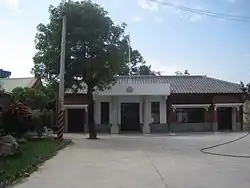| Former Dinglinzihbian Police Station | |
|---|---|
原頂林仔邊警察官吏派出所 | |
 | |
| General information | |
| Type | former police station |
| Location | Linyuan, Kaohsiung, Taiwan |
| Coordinates | 22°30′17.9″N 120°23′39.6″E / 22.504972°N 120.394333°E |
| Completed | February 1898 |
| Renovated | 1909 |
The Former Dinglinzihbian Police Station (traditional Chinese: 原頂林仔邊警察官吏派出所; simplified Chinese: 原顶林仔边警察官吏派出所; pinyin: Yuán Dǐnglínzǐbiān Jǐngchá Guānlì Pàichūsuǒ) is a historical building in Linyuan District, Kaohsiung, Taiwan.
History
The police station building was originally built in February 1898 as Yuan Dinglinzibian Police Station at Fusing Street. Soon, public school, market and township office were set up around the neighborhood, turning the area into a political and economic center for Linyuan. In 1907, it was renamed Linzibian Police Station and underwent renovation in 1909 as what it is today. After the handover of Taiwan from Japan to the Republic of China in 1945, the government took over the police station and put it under the administration of Fongshan District. In 1958, it was restructured as Linyuan Police Station. In 1989, the police station was relocated to its current address at Linyuan North Road due to space congestion at Fusing Street. Ever since, the abandoned building served as police dormitory building with parts of the building remained unoccupied.
In 2007, the Bureau of Cultural Affairs declared the former police station as a historical building.[1] The building then went renovation and reparation which was completed in 2009.[2]
Architecture
The building stands on a 4,620 m2 of land. The original police station building consisted of dormitory, garden, ancient wall, cistern and air raid shelter or detention area. It is a one-story Japanese-style building design with bricks and wooden materials.[1]
See also
References
- 1 2 Chen, Ting-fang (19 June 2019). "Linyuan". Information Bureau, Kaohsiung City Government. Retrieved 18 February 2022.
- ↑ "Historical Building Former Dinglinzihbian Police Station". Museums. Ministry of Culture. Retrieved 18 October 2021.